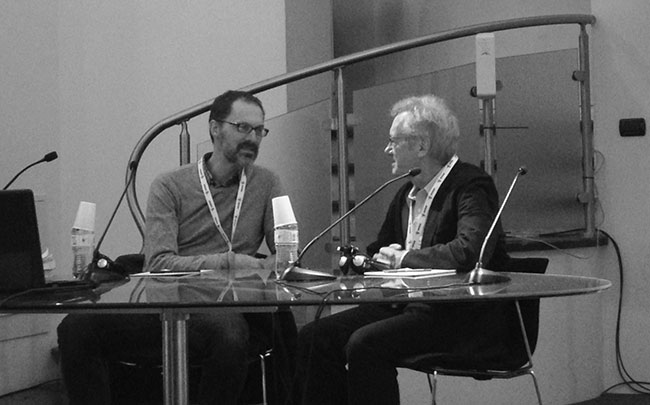Co-founder of the Lonely Planet guidebooks, Wheeler, talks travel, writing and tourism

“That first Lonely Planet book was not anything that was planned in any way,” said Tony Wheeler, co-founder of the world famous travel guide series.
“It just happened,” he said.
Growing up with a father whose job it was to fly around the world for what is now known as British Airways, an interest in the world was bound to happen.
“I didn’t know I was born in Britain,” he said, referring to the fact that he hadn’t lived there until the age of 16.
His travel background – including schooling in Pakistan, the Bahamas and the United States set him on a lifelong, worldwide adventure.
In 1972, Wheeler set out on a trip with his wife and Lonely Planet co-founder, Maureen, originally intending to be gone for one year, but instead they were gone for four. It was on this trip – through the “note-swapping” between travelers met on the road, the equivalent of an on-the-go social network – that they both decided to document their travels and create Lonely Planet, the very first “let’s go guide”.
Do it for the locals
Lee Marshall is a film critic and travel writer. He was Wheeler’s conversation partner in the International Journalism Festival’s talk about Wheeler’s latest book: Dark Lands.
“As a travel writer, it can be a rather… artificial debate about guidebooks,” Marshall said.
Many talk about the way travel writers can “ruin places they write about by bringing people into these beautiful, untouched paradises,” he said.
“I’ve ran a series of places I’ve ruined,” Wheeler replied.
“Bali, Thailand and Burma are on his list,” he laughed.
In fact, Wheeler’s projects have done quite the opposite for many countries. His book, Bad Lands, in a way the Dark Lands predecessor, was a response to former US President George W. Bush’s infamous speech in 2002 declaring Iran, Iraq and North Korea the “axis of evil.”
Wheeler explained that it was as if the President was presenting a challenge to travelers.
“He did more for [those countries’] tourism than any other US President,” he said.
Tourism has the potential to help poor countries or those under repressive regimes. Zimbabwe, Wheeler pointed out, was a shining light in Africa, but had “gone off the tracks.” With only one or two guests per year, the villagers weren’t receiving any sort of “spinoff”. “How do you feed yourself?” Wheeler asked, almost rhetorically. “You shoot something.” This lack of tourism not only affected the local population, it also devastated the wildlife.
Or Haiti. Being the economically weakest country in the Western Hemisphere, “poor Haiti was isolated from the very start,” he said. One cruise ship used to stop there every week, but just to go to the beaches rather than the tourist attractions, Wheeler explained. After the earthquake in 2010, that same ship stopped going there.
“How can you prevent the country from the little tourism they were getting?” Wheeler asked. “To say ‘stop’ to that is just ridiculous.”
“You have a much more rewarding experience,” Marshall said about travel writing in these countries – because the locals are grateful.
Stoned, arrested, and ‘reported to police’
While travel writing might sound like a dream job to many, it does come with its hidden – or not so hidden – dangers. For Dark Lands, Wheeler visited eight countries, among them the Democratic Republic of the Congo, Papua New Guinea, Israel and the Palestinian Territories.
And they all gave him stories to write about.
“I got stoned in Palestine,” Wheeler said. “I got stoned with real stones,” he added quickly. His sense of humor had the audience going. “I was mistaken for an Israeli, so I took my passport out and started waving it to show [the authorities] that it wasn’t an Israeli one.”
The anecdotes kept coming.
His stay in the Congo also didn’t come without problems. “I got arrested once in the Congo,” he said as if it were the most normal thing to happen to a foreigner. “Usually you get arrested to give them [the local authorities] money. You either pay money or you talk a lot.” He talked a lot – and he got out.
In fact, Wheeler believes that the most dangerous things usually occur “behind your back”, contradictory to what one might expect. For example, he thought his Boeing 727 flight between the Congolese cities of Kinshasa and Kisangani was normal. “It was 48-49 years old, but it looked pretty well maintained,” he said.
A week later, back home in Britain, he read in the newspaper that the only Boeing 727 Congo had, had crashed in the jungle.
New Guinea, on the other hand, was slightly different. “There’s no immigration control,” he said. It’s one of those countries, where you can simply show up.
“I went to a police station and I said: ‘I’ve just shown up in your country, I know it’s illegal, but can you let me in?’ ”
Within seconds, he received a “reported to police station” stamp in his passport, and there he was – “I got stamped in.” The audience laughed with approval.
With travel at heart
“From the very start with Lonely Planet [which he and his wife sold to BBC in 2007], we were doing countries that other people weren’t doing,” Wheeler said.
“I love comfortable travel, [too],” he added. “But it is more interesting to go to these unusual places. In unusual places, more unusual things happen to you,” he said.
By Gretchen Gatzke and Mina Nacheva